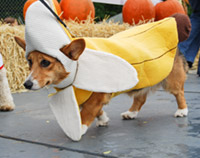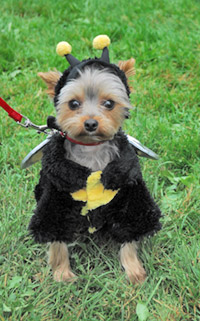Halloween Pet Safety
HALLOWEEN SAFETY FOR YOUR PETS

Halloween can be a fun celebration for people, but it can also be potentially dangerous – even deadly – for our pets. By being cognizant of potential hazards, pet owners can help reduce the likelihood of pet poisonings or mishaps on Halloween. Here are some things to avoid:
CHOCOLATE: Of all candies, chocolate poses the biggest Halloween “threat” to dogs. Many dogs are attracted to the smell of chocolate, making it a significant threat for massive ingestion. The darker and more bitter the chocolate, the more poisonous it is.

CANDY & SWEETS: Candy and other sweet foods – especially those containing poisonous xylitol – can also be poisonous to pets. Large ingestions of sugary, high-fat candy and sweets can lead to pancreatitis in pets.
RAISINS: Mini-boxes of raisins can be a healthy treat for trick-or-treaters, but they are extremely poisonous to dogs! Raisins are so dangerous that they deserve the same pet-proofing treatment as chocolate – stored in secure containers far from their reach.
CANDY WRAPPERS: When pets get into candy, they can eat the wrappers too. Ingestion of foil and cellophane wrappers can sometimes cause a life-threatening bowel obstruction, which may require surgery to correct.
GLOW STICKS / GLOW JEWELRY: Due to their curious nature, cats often accidentally ingest glow sticks and jewelry because they are bright and fun to chew. While not usually life-threatening, the contents can cause mouth pain and irritation, as well as profuse drooling and foaming.
COSTUMES: If you put a costume on your pet, make sure it doesn’t impair his vision, movement or air intake. If it has metallic beads, snaps or other small pieces, be aware that these pieces, especially those that contain zinc and lead, can result in serious poisoning if ingested.
If you suspect your pet has ingested a toxic food or a foreign object, call your veterinarian immediately. Or contact the ASPCA® Animal Poison Control hotline at (888) 426-4435 or visit online at http://www.aspca.org/pet-care/animal-poison-control